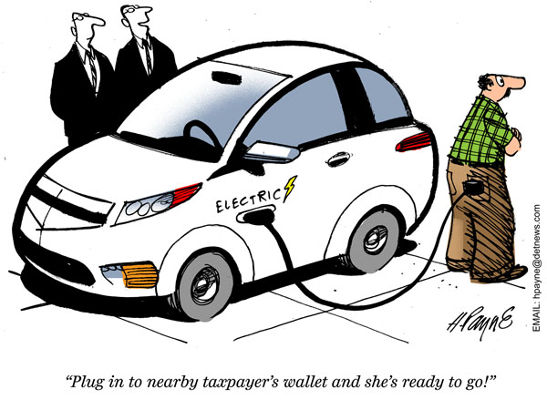While cold weather, as a new AAA study reveals, can reduce the range of electric vehicles by roughly 40 percent, the prospect of being frozen out of its windfall from Washington kicked the industry’s lobbying team into overdrive this winter.
For more than a decade, you, the American taxpayer, have been responsible for funding that windfall through a federal tax credit of up to $7,500 for every luxury electric car sold in the country. Currently capped at 200,000 units per manufacturer, electric vehicle buyers were the beneficiaries of $4.7 billion between 2011 and 2017; absent a repeal, the Joint Committee on Taxation (JCT) projects that figure to total $7.5 billion between FY2018 and FY2022 alone. The Manhattan Institute, meanwhile, estimates that the elimination of electric car subsidies could save taxpayers $20 billion.
Only compounding the ever-growing cost to the American people, NERA Economic Consulting’s September study determined that in the No Cap Limit scenario sought by lobbyists for titans like Tesla and General Motors – both of whom have already hit the aforementioned 200,000 per-manufacturer threshold – “total personal income of all U.S. households decreases by $7 billion in 2020 and $12 billion in 2035” on top off “higher total electricity costs” for ratepayers. Overall, NERA concludes that between 2020 and 2035, the net present value reduction in personal income of all U.S. households would swell to a staggering $95 billion.
Unsurprisingly, therefore, the industry’s new astroturf lobbying effort, dubbed the “EV Drive Coalition,” just hit a major roadblock in its push to extend taxpayer-funded subsidies for luxury electric vehicles: overwhelming opposition among voters.
Per a new national poll released just last week by the Energy Equality Coalition (EEC), “more than three-quarters (77%) of likely voters believe working-class Americans should not be required to subsidize the purchasing habits of the wealthy.” Cutting across political and partisan lines, “the vast majority of Republicans (81% to 12%), Democrats (72% to 13%) and Independents (78% to 8%) oppose working-class Americans subsidizing the purchasing habits of the wealthy.” EEC’s findings align with the strong unpopularity of the subsidies measured in previous polls. Last summer, for instance, 67 percent of voters were “resistant to the idea that they should pay for people to buy electric vehicles.”
Just as a multitude of surveys have reaffirmed the degree to which most Americans oppose electric vehicle subsidies, a multitude of studies have also revealed the extent to which a wealthy few benefit from them:
· In February 2018, a Pacific Research Institute study found that “79 percent of electric vehicle plug-in tax credits were claimed by households with adjusted gross incomes of greater than $100,000 per year”;
· In a 2017 survey conducted by CarMax / CleanTechnica, 17 percent of households – which was the largest share of any income bracket – earned $200,000 or more the previous year;
· Data from a 2017 U.S. Department of Transportation’s National Household Travel Survey revealed that “about two-thirds of households with [battery electric or plug-in hybrid electric vehicles] have incomes higher than $100,000”;
· In 2015, energy economists at the University of California, Berkeley found that “the top income quintile has received about 90% of all [Qualified Plug-in Electric Drive Motor Vehicle Credits];” and
· Citing data from the JCT, the nonpartisan Congressional Research Service –considered to be Congress’s think tank – added that “between FY2018 and FY2022, about half of the forgone revenue associated with the plug-in EV tax credit will be for corporations claiming the credit.”
Senator Jeff Merkley, therefore, was correct in stating that a certain “tax scam…is nothing more than a big payday for the wealthy, elite, and big corporations.” Although those words were intended to degrade the tax package he voted against – a package that is raising wages and lowering utility bills for his constituents in Oregon – they far more accurately describe the tax subsidy that the junior senator is fighting to preserve in Washington, DC for big, multi-billion dollar corporations and their elite, millionaire customers.
Thankfully, middle-class taxpayers and ratepayers have a champion in the United States Senate who fights just as hard for their bottom line as Merkley fights for the coffers of big electric vehicle corporations. In contrast to Merkley’s Electric CARS Act – an irresponsible bill to extend tax credits for toys of the rich – Wyoming’s John Barrasso recently introduced the Fairness for Every Driver Act to end them. Particularly as the industry promises to put “intense pressure” on lawmakers as their well from Washington runs dry, Senator Barrasso’s bill to repeal this reverse Robin Hood system could not come at a more critical moment.
As the “strong opinions against the federal government subsidizing the purchase of electric vehicles for the wealthy,” per the polling memo, grow even stronger, let’s rid ratepayers and taxpayers of this burden of subsidizing toys of the rich.

